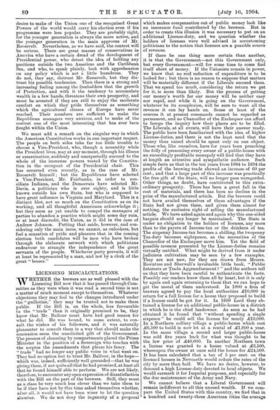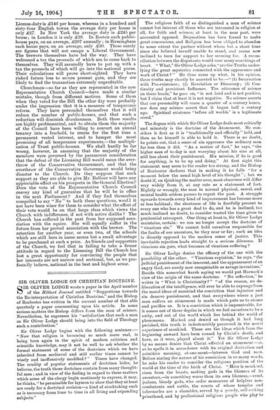W HETHER the brewers are as well pleased with the Licensing
Bill now that it has passed through Com- mittee as they were when it was read a second time is not a matter of much moment except to themselves. Whatever objections they may feel to the changes introduced under the "guillotine," they may be trusted not to make them public. If the Bill is, on the whole, less favourable to the " trade " than it originally promised to be, they know that Mr. Balfour must have had good reason for what he did.. He was bound, to some extent, to con- sult the wishes of his followers, and it was naturally pleasanter to consult them in a way that should make the concession seem the unsolicited gift of the Government. The process of closuring by compartments placed the Prime Minister in the position of a Sovereign who touches with the sceptre the amendments that please his fancy. The " trade " had no longer any public voice in what went on. They had no option but to trust Mr. Balfour, in the hope— which was, indeed, sufficiently well grounded—that he was giving them , if not quite all that he had promised, at least all that he found himself able to perform. We are not likely, therefore, to encounter any open expression of dissatisfaction with the Bill on the part of the brewers. Still, they must as a class be very much less clever than we take them to be if they have not by this time asked themselves whether, after all, it would not have been wiser to let the question slumber. We do not deny the ingenuity of a proposal which makes compensation out of public money look like an insurance fund contributed by the brewers. But in order to create this illusion it was necessary to put on an additional License-duty, and we question whether the holders of licenses were well advised in accustoming politicians to the notion that licenses are a possible source of revenue.
If there be one thing more certain than another, it is that the Government—not this Government only, but every Government—will for some time to come find itself short of money. If the Unionists remain in power, we know that no real reduction of expenditure is to be looked for ; but there is no reason to suppose that matters will be materially different if the Liberals succeed them. That we spend too much, considering the return we get for it, is more than likely. But the process of getting our money's worth for our money will be neither easy nor rapid, and while it is going on the Government, whatever be its complexion, will be sure to want all the revenue it can lay hands on. Some at least of the sources it at present commands cannot be regarded as permanent, and no Chancellor of the Exchequer can afford to forego the inquiry how their places are to be filled. The Liberals, at all events, will have their answer ready. The public have been familiarised with the idea of higher License-duties, and there is not the least need that the money thus raised should be spent only on one object. Those who, like ourselves, have for years been preaching the folly of presenting every owner of a public-house with an exceedingly profitable monopoly will find that they have at length an attentive and sympathetic audience. Such simple facts as that in the ten years from 1884 to 1894 the profits of the brewing trade showed an increase of 60 per cent., and that a large part of this increase was practically the free gift of the State, will no longer pass unregarded. Other things, no doubt, have contributed to this extra- ordinary prosperity. There has been a great fall in the cost of materials, and there has been no decline in the price of the manufactured article. But the brewers could not have availed themselves of these advantages if the State had not given them, and given them almost for nothing, the exclusive right of selling the manufactured article. We have asked again and again why this one-sided bargain should any longer be maintained. The State is under no obligation to the holders of licenses, any more than to the payers of Income-tax or the drinkers ,f tea. The sixpenny Income-tax becomes a shilling, the twopenny Tea-duty becomes eightpence, as the necessities of the Chancellor of the Exchequer move him. Yet the field of possible revenue presented by the License-duties remains virtually untitled. What might be derived from it under judicious cultivation may be seen by a few examples. They are not new, for they are drawn from Messrs. Rowntree and Sherwell's invaluable little book, "Public Interests or Trade Aggrandisement ? " and the authors tell us that they have been careful to authenticate the facts. Possibly our readers know them all by heart, but it is only by again and again returning to them that we can hope to get the moral of them understood. In 1900 a firm of brewers agreed to pay the local authorities £10,000 in return for a full license for a house they proposed to build • if a license could be got for it. In 1899 Lord Grey ob- tained a license for an additional public-house in a district in which he is the chief landowner. As soon as he had obtained it he found that "without spending a single sixpence" he could sell the license for nearly £10,000. In a Northern colliery village a public-house which cost £6,500 to build is now let at a rental of £1,800 a year. In the same village a second and larger public-house was sold five years back for what was thought to be the low price of £40,000. In another Northern town a license was granted to a house valued at £3,500, whereupon the owner at once sold the house for £24,500. It has been calculated that a tax of 5 per cent, on the licensed houses in Newcastle would reduce the rates of the city by more than half. We have no desire, however, to demand a high License-duty devoted to local objects. We would earmark it for Imperial purposes, and especially for the due maintenance of the Army and,Navy.
We cannot believe that a Liberal Government will remain indifferent to all this unused wealth. If we com- pare the United States with this country, we find that in a hundred and twenty-three American cities the average License-duty is £146 per house, whereas in a hundred and sixty-four English towns the average duty per house is only £27. In New York the average duty is £245 per house; in London it is only £38. In Boston each public- house pays, on an average, £297 annually ; in Birmingham each house pays, on an average, only £30. These surely are figures that will not escape a Liberal Government. The brewers themselves have led the way. They have welcomed a tax the proceeds of which are to come back to themselves. They will assuredly have to put up with a tax the proceeds of which will go into the national purse. Their calculations will prove short-sighted. They have risked future loss to secure present gain, and they are likely to find the transaction extremely unprofitable.
Churchmen—so far as they are represented in the new Representative Church Council—have made a similar mistake, though from different motives. Some of them when they voted for the Bill the other day were probably under the impression that it is a measure of temperance reform. They have persuaded themselves that it will reduce the number of public-houses, and that such a reduction will diminish drunkenness. Both these results are highly problematical, and to obtain them the majority of the Council have been willing to convert an annual tenancy into a freehold, to create for the first time a permanent vested interest, and to hamper the most promising of all temperance experiments,—the multipli- cation of Trust public-houses. We shall hardly be far wrong, however, in assuming that the majority of the members were governed by the paramount consideration that the defeat of the Licensing Bill would mean the over- throw of the Conservative Government, and that the overthrow of the Conservative Government would bring disaster to the Church. Do they suppose that such support as they are able to give Mr. Balfour will have any appreciable effect on his prospects in the General Election? Does the vote of the Representative Church Council convey any kind of guarantee that he will be in office in the next Parliament ? And if they find themselves compelled to say " No " to both these questions, woull it not have been wiser for them to consider what the effect of their vote would be on that large class which views the Church with indifference, if not with active dislike ? The Church has suffered in the past from her supposed asso- ciation with the squire. She will equally suffer in the future from her proved association with the brewer. The retention for another year, or even two, of the schools which are still hers in name seems but a small advantage to be purchased at such a price. As friends and supporters of the Church, we feel that in failing to take a firmer attitude in regard to the Licensing Bill the Church has lost a great opportunity for convincing the people that her interests are not narrow and sectional, but, as we pro- foundly believe, national in the best and highest sense.



































 Previous page
Previous page